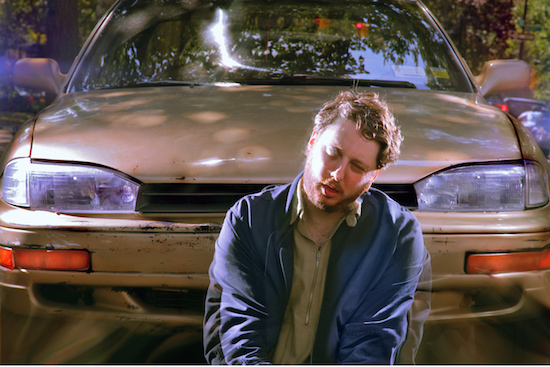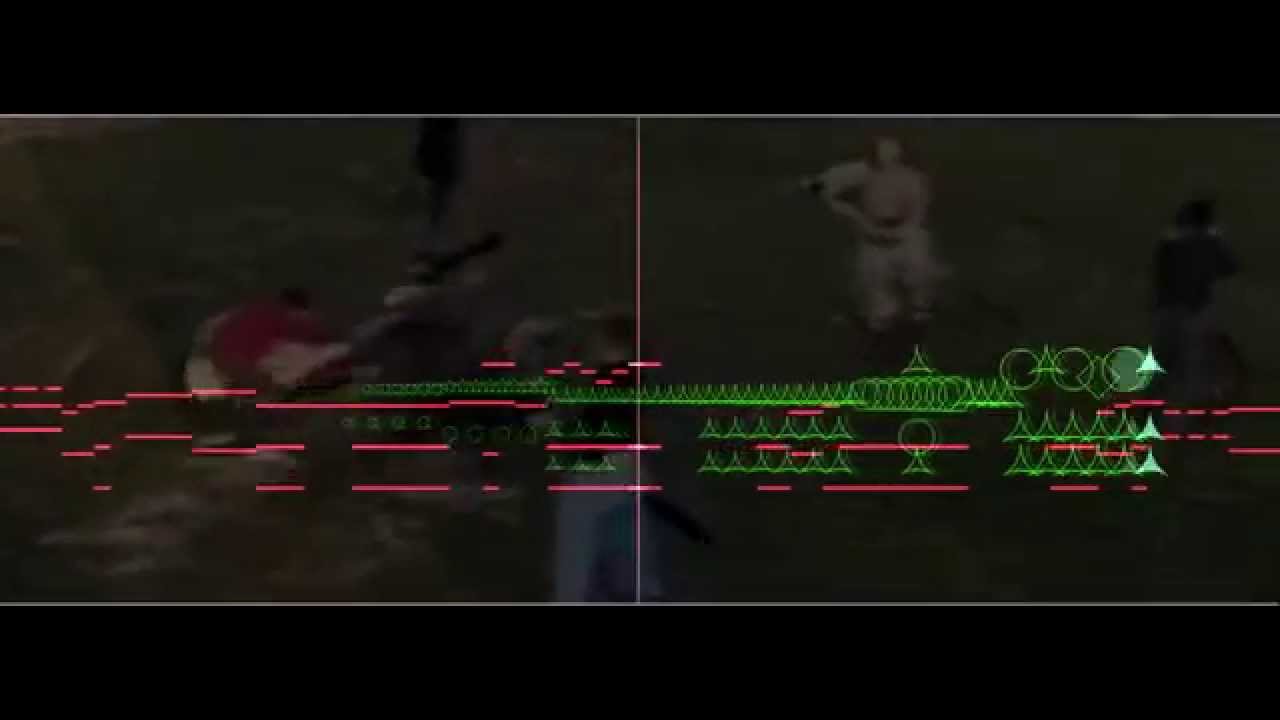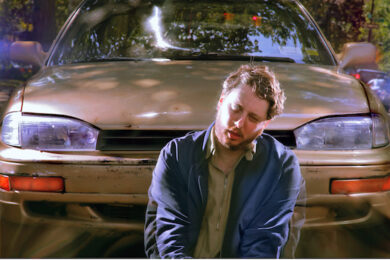It’s redemptive to know that Daniel Lopatin – generally better known as Oneohtrix Point Never – is as bemused as I am by the trend of labeling anyone who creates electronic music as a "producer". As a classification it doesn’t really tell anyone anything – "You’re a producer if you produce things! Has someone hired you to be a producer? Yes? Then you’re probably a producer" – and, with 0PN in particular, it seems reductive to a level bordering on ludicrous. Revisiting 2013’s R Plus Seven in preparation for this interview, I’m not listening to ‘Americans’ and nodding with enthusiasm for its technical gloss – it’s the composition that’s most astounding. Lopatin isn’t T Bone Burnett or Metro Boomin, and listening to this album is more like listening to a twisted, cubist reimagining of Joe Hisaishi’s Princess Mononoke score. Music seen "through a Ghibli, darkly". Or something.
And, though there’s a certain link between Hisaishi and R Plus Seven in particular – more solidly in terms of instrumentation, and more erroneously in terms of "feel" – the link is actually more pronounced on Garden Of Delete: where GOD shines above and beyond other 0PN records is in the light of a now-refined, more pronounced gift for conjuring; for being allusive rather than imperative. For projecting an image without pandering to – or deliberately obstructing – interpretations of the listener.
Even the PR campaign for the record – obscure blogs, hidden MIDI files, tangential videos – was more like getting caught up in some late-night YouTube, Wikipedia rabbit hole of conspiracy theories and ill-advised medical self-diagnoses than a press release for an album, encouraging full submersion in something that was neither fact or fiction but had the quality of being somehow vital and totally necessary at that moment — as everything does in those insomniac hours when the self is at its most porous. The closest comparison to Garden Of Delete probably isn’t even a piece of music — or the parallel discography of another artist — but something like ‘Nested’: a self-contained world, both claustrophobic and seemingly infinite.
Sitting now, on a roof terrace in North London, under a bright and uninterrupted expanse of sky, pegged in by the sprawl of the surrounding industrial landscape — as Lopatin, having just readopted the habit, lights a cigarette — it’s a reminder that, for now at least, the face of even the most ardently electronic music is very much a human one.
Back in 2013, when you were doing press for R Plus Seven, you talked about the songwriting process as something more akin to sculpture or architecture — that you think of it more like creating a space, filling it with objects and ‘seeing what happens to the objects over time’. Have you ever heard of the memory palace?
Daniel Lopatin: What is that?
It sounds kind of absurd, but you "build" a house in your head and you fill the rooms with the things you want to remember. It’s a kind of visual mnemonic. I wondered whether that idea has any bearing on how you work – whether the things you’re putting in the spaces you create are personal things, parts of you, or something more objective?
DL: Yeah, and even more so on this album. I think, with R Plus Seven, I was letting myself speculate more without intervention from my personality: it was more abstract, more about form, and maybe Garden Of Delete is more biographical in some weird way.
But the thing is – and maybe I should actually have done that exercise throughout my life – I don’t remember very clearly the things that I want to.
No one does really, do they?
DL: Yeah, right? I think people tend to remember the more traumatic stuff, and I think that’s what happened for me. I was looking back and just remembering these humiliating situations, thinking ‘Why did I behave like that?’
‘Why has everything I’ve done been so terrible?’
DL: ‘Why did I keep a sociopathic notebook about the girl that I was obsessed with?’ This album is a little bit more of a memoir in some weird way, but it ends up being speculative anyway by virtue of me not remembering – and my boredom with myself. I tend to just immediately fictionalise things, tweak them.
I think you need to look sceptically at anything that claims to be based entirely on memory, anyway.
DL: Doing these interviews, you start becoming such a politician, refining your ideas: the first day you’re saying, ‘Uhhh, I don’t know’, and by the end you’re like, ‘This is what I want’ with absolute certainty.
But, I do think it’s true that the past and the future are speculative at best. We seem to invest so much time and belief that those things are stable in some way – something to build towards, or something to use to better understand where we come from. So often those expectations are just so out of line with how the universe works. I don’t see it as a productive way of seeing the world, so, when I deal with that stuff formally – or when I try to allow it to inspire me — I’m open to it twisting itself up.
Talking about your work like this, it reminds me of something you said previously – about needing a different vocabulary for talking about music. I do think in recent years there’s been a move toward more art criticism-type writing in the music world. Do you think that’s closer to how we should be talking about it, or just getting further from the point?
DL: I enjoy those conversations, but the danger is that they can become really rhetorical – like a closed system of talking. It’s easy to veer in that direction if you have that way of thinking, if you have that framework or that background. But there’s also something to be said for trying to explain things plainly.
My mom told me something about the new record, and the way she put it was so perfect and honest it made me feel like such an asshole. She said, ‘Usually I need to picture something in my mind when I’m listening to your music – like a metaphor, a movie in my head to get through your ideas – but this time I can just listen as if they’re songs’. That made me feel good, because that’s kind of what I wanted to do – to write songs. But it was also really simply put, and it made me think about how that’s a totally fine way of talking about things too. I’m pretty conflicted, I guess.
Even though R Plus Seven had a kind of a narrative edge to it, I think GOD — though it might not seem like it on first listen — has a much clearer arc to it. Was that something that you definitively set about wanting to do with this album?
DL: I’m just as satisfied after watching a Paul Verhoeven film or a James Cameron film as I am after watching a Tarkovsky. Not that I put myself on any of those director’s levels, but I feel like R Plus Seven was a little more in the style of Tarkovsky: there was a little more of an ambiguity to it. There are ideas that you can contextualise things around, but even if you don’t do that, it still kind of has this vague sense of ‘Okay, now follow my lead’. And that’s continued here. I feel like they’re connected, they’re albums that have this ‘choose your own adventure’ quality.
But I’m so out of touch, I’ll say these things and people will be like, ‘Really? I think it’s totally insane music’, or, ‘I think these could be pop singles’. It just varies on people’s comfort levels and expectations about what they think a song is. But, for me, the songs on Garden Of Delete are much more direct. They progress more like an album of songs does.
There’s definitely something to be said for listening to it as a whole, rather than cherrypicking tracks.
DL: As a fan of the golden era of record making, I just like sit down and listen to Dark Side Of The Moon all the way through sometimes. I can’t shake that impulse. If you’re going put 50 minutes of music together, do something with it.
But I also realise that people do listen to music in this track-by-track way – I know I do. So I did ask myself, ‘Is every song a good song, or do they need each other?’ And I don’t think they do, other than the interstitial weird stuff. It’s kind of designed to be like a totem: there’s a whole, and then there’s these individual constructions, these faces.
It’s like what you said about the ‘choose your own adventure’ format: it seems like an exercise in world building, like a Final Fantasy game or something. You’ve created what seems like not just an album, but also a universe for the music to sit in.
DL: Yes, exactly. The big lesson that I get from those types of structures is that you can revisit a similar place and have a different experience with it because they’re such generous places. They have a lot of detail, and they feel like stronger constructions, because even though there’s a macro-level story there’s still a sense that you can try things again.
I always fear with music that it can be too immediate – too geared toward a "get addicted to it and throw it away" mentality. I get so melancholic once I fall out of love with a piece of music, and I try to make music that I think will at least able to grow with me as I get older. I think about the 13-year-old-kid version of me who watched A Clockwork Orange and loved it. And then, 20 years later, I can watch it and I probably have a very different, if not more critical, viewing of it. I still love it, but it’s a completely different film. I imagine that the 87-year-old version of me, if there is one, might have some interest in that film too. I think that’s something to strive for.
You’ve said before about wanting to move away from making claustrophobic music, ‘music that was constantly filled up’, and the second half of the record does that. It opens itself out a bit –
DL: Yeah, I corrected that halfway through, huh?
But it’s interesting, in an allegorical sense, creating the universe for that record: it starts in this highly-dense, singular point and explodes out into something more expansive – something kind of immense.
DL: Oh yeah, definitely. And I also think of the album as a sort of hyperactive child who drinks a lot of sugar and then crashes really hard. It has a lot of energy at the front, a lot of entangled ideas, and then gets into an almost manic depressiveness by the end.
Speaking of exercises in world building, what did you make of Melissa Broder’s <a href="http://rhizome.org/editorial/2015/mar/30/poetry-practice-melissa-broder/" target= new">R Minus Seven?
DL: Oh, pfff, I’m such a huge fan of hers – she’s incredible. I’m always impressed with people whose hyper-self awareness lends its self to good art-making practices, and she’s the perfect example of that. She has this virtuosic sense of herself. She’s able to show, through poetry, the form of her whole decision-making process – her whole thought process. It feels very similar to what I do. But, to me, she’s a pop star: one sentence that just nails it, like, ‘Fuck! That’s so true’. It’s almost like what comedians do, but on a much more interesting level.
That also allowed for the world of R Plus Seven to grow into something even bigger, which is a kind of expansiveness you’ve pushed through to GOD in what you’ve done with the promotional trail.
DL: If I’m completely honest, I was feeling pretty anxious about round two of "promoting" a record – which I’d never done properly until R Plus Seven. That was one experiment –I learned how that cycle goes, and I think I did a good job. But, also, I was discouraged that it has this inbuilt predictability to it: first song, second song, video, gimmick number 500.
Premiere here, premiere there.
DL: Yeah, and it’s fine. It’s really nothing that needs to be heavily revised, because the purpose of that isn’t to talk to the fans – it’s to find new ones, and I get that. But I don’t know how to talk to new fans. At this point, for the first time in my life, I feel like I have a cool and loyal group of people that are like, ‘He’s our neighbourhood musician-guy, we like his stuff, we’re going to go with him – whatever he bakes this week, we’re gonna eat’. I wanted to talk to those people. So, I decided I was going to do whatever I had to do to make those four months between handing them the record and it coming out as productive as possible, and make it a time where I could have fun with what I do, and make some sense of the album for myself. It’s more of an experiment than the record, really.
Certain things will surprise me, and I’ll wish I might have revised my ideas. But it was an experiment in giving away control, letting other people ambiguate my work, and not being so territorial and possessive and crazy. Lawrence Lessig is running for president in the United States – he’s the Free Culture guy – and I was reading about him and checking out some of his writing, and I was like, ‘You know what? I kind of think I’m down with this’. For the first time in my life I think I might vote with a sense that I’m not making the best of a bad situation. With actual purpose.
There are a lot of really complicated trade networks at play right now in culture – things are being shared whether you like it or not. So why not just try to like it?
Surrendering control like that reminds me of something you said before about the MIDI saxophones on R Plus Seven – about wanting to have them almost completely characterless. It’s like this Rothko-esque canvas: when you have no characteristics of an instrument it allows someone to populate that instrument with how they expect it to sound, or how they want it to sound.
DL: Yes, I think so. But also I’m a little bit possessive of those sounds because I feel like they’re kind of toxic, and I want to fold a little bit of criticality into them. But, looking back at R Plus Seven, there are moments where I really do allow them to just be wallpaper. It’s like an album of interiors to me: it’s interior design, it’s not interior art.
You just have to let things be sometimes, or let the thing next to it be the criticism and not the way you deal with it on a material level.
If you give someone negative space they’ll fill it with something – a part of themselves, probably – and Garden Of Delete is kind of the opposite of that.
DL: Precisely. I just went to see ‘Dream House’, and I immediately laid down and went down into administrative anxiety mode. For the first 20 minutes of being in this weirdly serene, dissonant space it was very hard for me to detach from my own idiosyncratic problems. But the longer you stay in there, the more your body adjusts, or re-calibrates itself to dealing with that kind of environment. It’s true, though, that the more empty something is, the more idiosyncratic potential it has.
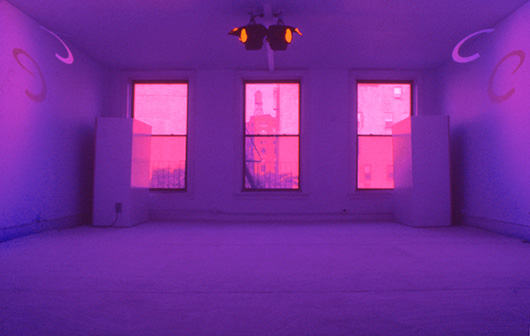
Similarly, the denseness of the first half of GOD is sort of Finnegans Wake-ish: cacophonous, overwhelming, but somehow leaves enough room for someone to make whatever they want of it.
DL: I would hope so. I’d like that. It’s definitely a little bit like, ‘this is my trip and you’re on it’ – but it’s conflicted.
Where does Garden Of Delete, as a title, come from? In my head it’s like the process of sampling and sound archiving – taking pieces from something, out of context, which are kind of amorphous on their own and don’t necessarily "mean" that much, but put together you get a bloom of something much more. Something bigger.
DL: Yeah. I think that’s an eloquent way of putting it. That’s definitely part of it: a reference to the process. But it’s also about how a garden is seen as a productive place – a place with which we generally associate good feelings – and deletion is perceived as a more negative environment. And so, in dealing with all these kind of personal traumas and negative thoughts, I was realising that those are productive, too: those are actually harvesting good things. It was a sort of reminder, a kind of Taoist message to myself, that this was a good thing that I was doing for myself. It shouldn’t be painful.
I’ve seen you use the phrase ‘non-musician making music’ to describe yourself before. In terms of the more standard labels of creating, where do you position yourself? I was listening to R Plus Seven and it reminded me more of something like Joe Hisaishi’s scores for all those Studio Ghibli films than more obvious contemporary electronic music.
DL: Yeah, well, I do struggle. I’ll listen to Ligeti’s Études with complete fascination, and if you’re someone who understands music theory you can probably listen to his music and hear why and how certain techniques were pioneered. I don’t grasp all of that, simply because I have like two years of piano training under my belt from when I was seven years old. That’s why I call myself a non-musician, in the kind of professional musician sense of the word.
But I don’t know if that’s necessarily relevant anymore. Google is trying to figure out certain AI processes that will take over human knowledge, or human skill, and probably some awkward epoch is coming where music will undergo these horrible Deep Dream interpretations. On some level, Garden Of Delete feels predictive of that: at times it sounds like the dumbness of machine knowledge trying to recreate music.
Because you’re engaging with this kind of thing – and Holly Herndon is probably a good example of this as well – people sometimes criticise your work for being over-intellectual, deliberately balking at the idea of being "accessible". Sorry, I really do hate that word.
DL: Yeah, it’s so boring, right? It’s just like a synonym for harmlessness. But I don’t know: I think, if you can only talk about your stuff in a jargonistic way, you’re not as smart as you think. You’re alienating people who deserve to have a conversation, or a place in the conversation. If you take the complete inverse and are staunchly anti-intellectual, then I think there’s a certain amount of resentfulness in that. There’s something about that standpoint that feels a little bit insecure. Why can’t you just let people have their way of talking about things? It becomes almost like a kind of weirdly proletarian thing: like intellectualism is somehow endangering things on a class scale. I think that’s a dangerous approach.
I’m interested in philosophy, I studied it, and I also admit I try to read things that are way above me. I have a limit: I take what I need from it, and I do find that some of my favourite philosophical writings tend to be poppier. I admire smart people who are able to describe things simply or in a human, readable way.
There’s plenty of intelligent philosophy that isn’t setting out to alienate the people who are reading it.
DL: Barthes was fun, right? I was reading Julia Kristeva’s Black Sun – that one’s really dark – it’s basically her death metal record. But ‘Powers of Horror’ is kind of the one. It illustrates, in a really simple way, that – as people, and as a culture – we’re fascinated with the grotesque. When we sneeze we have to look at the napkin first, you know? That’s it: that’s the moment. It’s a beautiful example of how we haven’t escaped our primalcy yet – even though we want to. And that’s what society is, that napkin. Throw it away, pretend it didn’t happen. That’s all over Garden Of Delete.
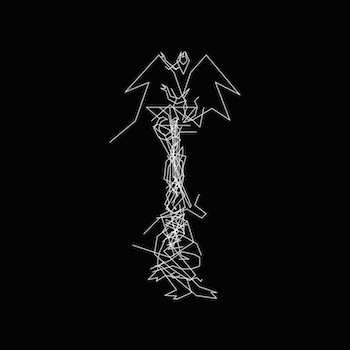
Garden Of Delete is out in November on Warp Records

